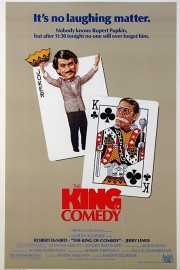The King of Comedy
It’s interesting that Martin Scorsese was able to keep “The King of Comedy” from an R rating. But then again, there really isn’t anything in Paul D. Zimmerman’s script that would merit it. (If it were made today, it would have been a PG-13 easy.) Nobody dies, nobody gets excessively violent, and the adult situations that do take place in the film are played for dark laughs. Even though Robert DeNiro was keen to make a film of Zimmerman’s script before the film, I find a lot of similarities between this film and Scorsese and DeNiro’s “Taxi Driver,” which is also about an isolated man who fantasizes about having a life different from the one he has, but given the choices he makes throughout the film, that can never happen. “Taxi Driver” is a better film, but “The King of Comedy” is definitely one of the most fascinating additions to Scorsese and DeNiro’s collaboration together.
DeNiro stars as Rupert Pupkin, am aspiring stand-up comic who is obsessed with TV talk show comedian Jerry Langford (Jerry Lewis). He spends his nights outside of Jerry’s studio wanting an autograph and to talk to him, along with other obsessive fans. One night, one of those fans (Masha, played by Sandra Bernhard) gets into Jerry’s limo, and Rupert finds a way to make his dream come true. He makes his way into Jerry’s limo and is able to pitch him on the opportunity to appear on the show. Jerry has him make an appointment with his people, but it’s more of a way to get Rupert out of his limo than anything. Rupert fantasizes about how things are going to go with Jerry, goes on an abortive date with a bartender (Rita, played by Diahnne Abbott), and gradually gets more and more frustrated when Jerry’s staff runs interference with Rupert’s plans to meet with him. It’s not surprising to see where things go from there.
It must have been an absolute delight for Scorsese, the consummate film student, to get Lewis, the original Nutty Professor, and the Absent-Minded Professor, to agree to the role of Jerry Langford. Although the initial choice of Johnny Carson would have made more sense given that he was a talk show hosting legend, Lewis was, arguably, the bigger icon, and since the film deals so much with the price of celebrity and fan worship, you need someone with a bigger-than-life persona, and who probably understands the predicament Langford finds himself in, from first-hand experience, and it’s hard to imagine someone more well-equipped to play that than Lewis. Lewis is game for what Scorsese and DeNiro are wringing out of Zimmerman’s script, and I think one of the things that I was so surprised about is how straight Lewis’s performance is. This is an honestly dramatic turn, with some dry humor, from Lewis, and it’s a pleasure to watch him play off of DeNiro and, especially, Bernhard after Masha and Rupert kidnap him. They both have their own fantasies they want to see play out with regards to Langford, and they get a chance to make it happen. Bernhard is hilarious when she’s given a chance to do a “romantic dinner” with Langford, and while you would like to see Lewis deliver some sharp wit during the scene, the straight face he puts it on says it all, and makes the scene even funnier as Bernhard plays her character’s damaged psyche to the hilt. This was her big breakout, and to have that with Scorsese is a blessed thing that is a wonder to behold.
This is ultimately DeNiro’s film, however, and he does some of his most fascinating work with Scorsese here. The pair were coming off of “Raging Bull” in their collaboration together, and this is an interesting way to follow that up. After the brutal emotional cleansing of “Raging Bull,” however, it was probably a necessary tonic that allowed them to get some lighter moods into them, and I was fascinating to learn that this was kind of a passion project for DeNiro, and he really dives into the role of Rupert Pupkin. At this point, DeNiro had not really found a voice as a comedic actor (that didn’t happen until the 1-2 punch of “Analyze This” and “Meet the Parents”), and it shows, and it also shows that Scorsese wasn’t quite ready for a fast and loose tone that would make us laugh out loud with the serious gangster exploits in “GoodFellas,” and might have made this land like a comedic bomb. Twenty years later, this might have killed, but this still has some very funny things going on in it, and it’s refreshing to watch one of the great actor-director pairings of all-time take a chance on something, even if neither of them were quite ready for it. Was this supposed to be a straight comedy? Not at all, but one of the biggest issues I have with the film is that it feels like it’s going for laughs at times, and they don’t land. That doesn’t mean it doesn’t have value, though, and even for just being a vital part of Scorsese and DeNiro’s collaboration, it’s well worth watching. Lewis and Bernhard are simply toppings on top of this interesting sundae treat.










